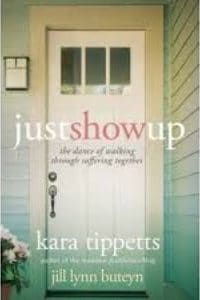Book Review: Just Show up, the dance of walking through suffering together.
<- Back
Just Show up, the dance of walking through suffering together.
Book Author: Kate Tippetts and Jill Lynn Buteyn
Review Author: Renae Witten
Baldivis Free Reformed Church
Pro Ecclesia Bookshop
Just Show up, the dance of walking through suffering together
By Kate Tippetts and Jill Lynn Buteyn
2015/190 pages
I was recently given a book to read titled Just Show Up by Kate Tippetts and Jill Lynn Buteyn. Kate,
mother of four and wife to a pastor, was battling cancer when she and her friend, Jill, decided to
write a book about showing up for one another amidst suffering. They write about “what friendship
looks like in the midst of changing life seasons, loads of laundry and cancer”. Each of the nine
chapters are written by Jill, followed by a short section that Kara wrote, and concludes with a few
discussion questions.
As I read this book (190 pages), I came to appreciate the practical suggestions given for how to
support someone who is suffering from cancer or otherwise. I valued the honesty of the authors in
acknowledging how, in this “dance of walking together through suffering” we will mess up and need
to extend grace to one another for saying the wrong thing. This will happen from both sides, but
being able to forgive and move on is healthy and possible as we imitate Christ.
One helpful principle Jill writes about is “comfort in, dump out”. The idea goes like this: as a friend or
relative, you bring words of comfort to those who are relationally closer to the person who is
suffering than you are, and you “dump out” to those who are further out than you. The book uses an
illustration of concentric circles to clarify this point. The person suffering is in the middle of the
circle. The person closest to them is in the next circle. Then close friends, and so on. For example: Jill
doesn’t pour out her heartache and sorrow about seeing her friend suffer to Kara herself, or to
Kara’s husband - because he is closer to Kara than she is. Instead, she is conscious to only pouring
“comfort in”. But Jill can express her own sorrow and pain to her own mother, because she is further
removed from Kara. This is something we may do instinctively, but in the hard moments we can
easily be tempted to focus on ourselves and “dump in”.
Jill also writes about learning to be comfortable with being uncomfortable. Seeing a friend suffer and
wanting to say just the right thing can paralyse us into doing nothing and staying away. Jill has seen
how much better it is to just show up, putting aside her own desire to be comfortable. She admits
she won’t get it right every time, but there is grace for that. She is learning the value of listening and
being present vs wanting to say just the right thing to take away what is hard.
However, this book is more than a practical guide on ways to “just show up”. It also brings out the
theology of the authors.
I found the way Jill speaks of the work of the Holy Spirit to be vague and misleading, in a slippery
sort of way. Phrases like “Heather felt the prompting of the Holy Spirit to show up for her” (pg 109)
and “ask God to bring that person’s name or face to your thoughts, and trust your thoughts when
they come” (pg 31). These phrases sound spiritual, but they are misleading. Consider for a moment:
What does this prompting Heather experienced, feel like? Did Heather perhaps read that morning of
the call to love her neighbour as herself? Or was her conscience pricked when she realised she has
been living for herself lately and ignoring the needs of those around her? Or did she flip open her
Bible and read the name of her afflicted friend in the passage in front of her? This pious way of
speaking is too vague to be helpful. Do you speak this way? What do you mean when you do? Do
you see how it could be misleading to others? When I read that Heather was feeling prompted by
the Holy Spirit, I was tempted to ask myself, “Hmm, I haven’t felt any promptings from the Holy
Spirit. Why not? What’s wrong with me? And if one day I would feel something, how would I be sure
it was the Holy Spirit?” Similarly, how far can I “trust my thoughts” if I’ve asked God to give me a
certain thought? Do I claim it to be an infallible revelation? These phrases take us away from living in
freedom before the face of God, joyfully doing His will as we find it in His Word. While thinking
about this, I picked up Kevin DeYoung’s book, “Just Do Something; A Liberating Approach to Finding
God’s Will” and found it to be a must-read for anyone who has ever been confronted with this way
of thinking and speaking of God’s will.
Besides the above concerns, I also didn’t appreciate Jill’s trite way of speaking about heaven (pg
177). The focus was very much on being reunited with friends, with no mention of the joy of being in
our Saviour’s presence. For these reasons, I can’t see myself encouraging a friend to pick up this book
or ever taking the time to reread it. What I did value was the practical suggestions and principles
outlined in the book and being motivated to read a fantastic book about understanding God’s will
for our lives…but more on that another time.
Renae Witten, Baldivis

